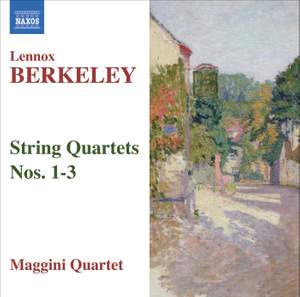Offer,Lennox Berkeley - String Quartets Nos. 1-3
Maggini Quartet
The partnership between Naxos and the Magginis has opened up the British quartet reportoire, and also seen the Quartet itself growing in confidence and maturity. This CD is one of their first... — More…
CD
Original price ($11.75) Reduced price $9.25Downloads
What are FLAC and MP3?Contents
Berkeley, L: String Quartet No. 1, Op. 6
Work length26:27
$6.00
$7.80
- Maggini Quartet
- Recorded: 7-9 December 2006
- Recording Venue: Potton Hall, Westleton, Suffolk, England
I. Allegro - Moderato
Track length7:51
$2.00
$2.60
II. Andante non troppo - Lento
Track length5:51
$1.00
$1.30
III. Scherzo: Vivace
Track length3:57
$1.00
$1.30
IV. Theme and 6 variations: Moderato
Track length8:48
$2.00
$2.60
Berkeley, L: String Quartet No. 2, Op. 15
Work length18:27
$4.00
$5.20
- Maggini Quartet
- Recorded: 7-9 December 2006
- Recording Venue: Potton Hall, Westleton, Suffolk, England
I. Allegro moderato
Track length7:10
$2.00
$2.60
II. Lento
Track length5:30
$1.00
$1.30
III. Allegro
Track length5:47
$1.00
$1.30
Berkeley, L: String Quartet No. 3, Op. 76
Work length18:01
$4.00
$5.20
- Maggini Quartet
- Recorded: 7-9 December 2006
- Recording Venue: Potton Hall, Westleton, Suffolk, England
I. Allegro moderato
Track length4:32
$1.00
$1.30
II. Allegro vivace
Track length2:21
$1.00
$1.30
III. Lento
Track length6:05
$1.00
$1.30
IV. Molto vivace
Track length5:03
$1.00
$1.30





